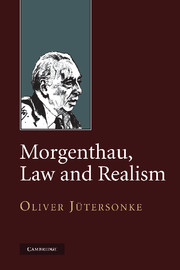Book contents
- Frontmatter
- Contents
- Preface
- Acknowledgements
- Note on the text
- 1 Hans J. Morgenthau in International Relations
- 2 The justiciability of disputes
- 3 Hans Kelsen and the reality of norms
- 4 Legal realism and behaviouralist social science
- 5 Legalism, romanticism and irresponsible statecraft
- 6 The legacy of legal formalism
- Name index
- Subject index
- References
1 - Hans J. Morgenthau in International Relations
Published online by Cambridge University Press: 17 November 2010
- Frontmatter
- Contents
- Preface
- Acknowledgements
- Note on the text
- 1 Hans J. Morgenthau in International Relations
- 2 The justiciability of disputes
- 3 Hans Kelsen and the reality of norms
- 4 Legal realism and behaviouralist social science
- 5 Legalism, romanticism and irresponsible statecraft
- 6 The legacy of legal formalism
- Name index
- Subject index
- References
Summary
The benefits to be had from transcending standard renditions of realism as being about crude inter-state power politics have recently been the subject of much debate. After having been proclaimed defunct at the beginning of the 1990s, efforts are now being undertaken to unearth the rich tradition of classical realism that has been lost to the scientific approach of subsequent structuralist, neo-realist approaches and the consequent fragmentation of the tradition.1 Under the influence of rationalist social science, so the story goes, the European realism taken across the Atlantic by the likes of Hans J. Morgenthau (1904–80) had been transformed into an approach that was no longer based on anthropological foundations revolving around the innate drive for power in human nature, but on rational action expressed in empirical correlations and abstract models. Today, in a time in which a single superpower wages a War on Terror against a largely unidentifiable enemy, the gap between normative (US) foreign policy and International Relations theory is seen by many to be wider than ever before. Robert Kaplan's Warrior Politics, Robert Kagan's Of Paradise and Power, and Anatol Lieven and John Hulsman's Ethical Realism are just three popularistic examples of calls to revert the focus back from scientific theory construction to the ‘art’ of the realistic statesman, in an effort to link practical politics with ethical principles.2
In the academic field of International Relations, there has been a comparable attempt to reinject the ethics of statecraft into the debate.
- Type
- Chapter
- Information
- Morgenthau, Law and Realism , pp. 1 - 36Publisher: Cambridge University PressPrint publication year: 2010



